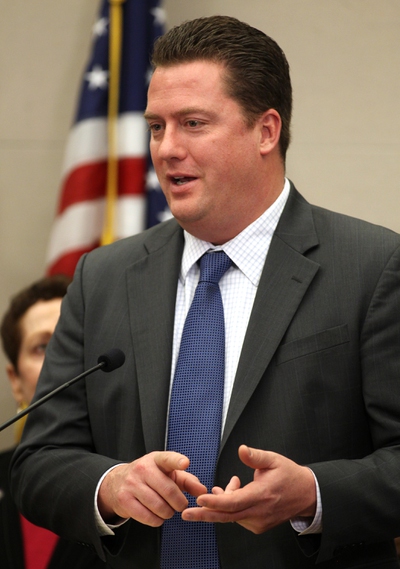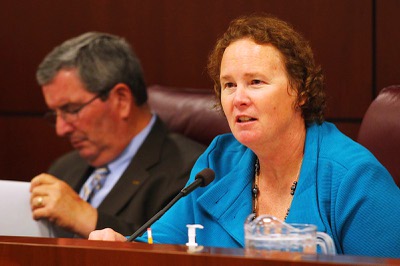Tuesday, March 15, 2011 | 2 a.m.
Sun Coverage
Democrats announced a series of reform bills Monday that they say will protect consumers and make the health care industry more transparent, including bills that would give the public access to data on preventable infections and injuries at hospitals.
Senate Bill 209, the product of an interim legislative committee headed by Sen. Valerie Wiener, D-Las Vegas, would require hospitals to give data to the state for public release that reflect on the quality of patient care.
Wiener said the goal is to create a meaningful resource for “consumers to shop and compare hospitals” by giving them the opportunity “to compare apples to apples and oranges to oranges.”
Sen. Sheila Leslie, D-Reno, said her bill, which is being drafted, would expand what hospitals need to publicly report that would help consumers gauge the quality of those hospitals, and also require the state to publish a database of the information. Without it, she said, “We’re requiring patients to play roulette with their health care.”
As a moving force behind those two proposals, lawmakers credited the Las Vegas Sun’s series “Do No Harm: Hospital Care in Las Vegas.”
The series was based on the newspaper’s analysis of 2.9 million hospital billing records that had been collected by the state but not been disclosed. The data revealed preventable injuries, infections and surgical mishaps suffered by patients in Las Vegas hospitals — totaling 3,689 in 2008 and 2009 and broken down by facility.
“The Las Vegas Sun truly fulfilled its role as the fourth branch of government,” Leslie said at a news conference Monday. “The reporters, we are inspired by their hard work.”
Before the Sun series, hospitals sought control over patient-outcome information, giving to officials the aggregate statewide total of the data without breaking it down by facility. Neither the scale of avoidable incidents nor the hospitals where the harm occurred have been publicly known, in part because hospital lobbyists have resisted the state’s efforts to make the information more public.
The trade and lobbying organization for Nevada hospitals will publish its own website with data on “sentinel events” — incidents where patients were injured or harmed while under hospital care — within the next two weeks, said Bill Welch, president and CEO of the Nevada Hospital Association.
The hospitals have supported greater transparency, but there was little value in putting out “raw data,” he said.
Leslie said after the Sun series, some hospitals began to individually publish data on preventable events. That put pressure on the hospitals reluctant to be transparent.
“I think there’s been a shift” from hospitals, she said. “The writing’s on the wall. It’s better to jump on now and get credit than be forced to do it.”
Despite the industry’s plan to publish a website, the state “has its own obligation, as a neutral third party, to publish the data,” she said.
Welch said he had “no qualms” about the state publishing its own information. But, he noted, the association’s project would not cost the state.
The Nevada Hospital Association could support SB209, he said, but he was still reviewing draft language of Leslie’s bill.
Among other reforms proposed by Democrats on Monday:
• Assembly Speaker John Oceguera, D-Las Vegas, proposed removing the “trade secret” designation about health insurance information. This will create more transparency about proposed rate increases, and gives the state insurance commissioner the ability to open hearings on rate increases.
• Require medical facilities to develop and adopt safety checklists. Oceguera said checklists would be reviewed annually.
• Eliminate overbilling from out-of-network providers in emergencies. Sen. Allison Copening, D-Las Vegas, said it would allow a “fair rate,” determined by the insurance commissioner, when someone has a medical emergency and is taken to a facility not “preferred” by a person’s insurance company.



Join the Discussion:
Check this out for a full explanation of our conversion to the LiveFyre commenting system and instructions on how to sign up for an account.
Full comments policy